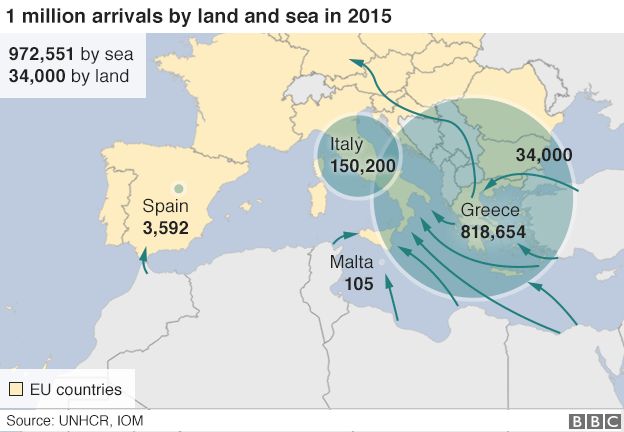Chris Morris writes: The European Union has often taken its boldest steps at moments of crisis. But although the political impulse to “keep the show on the road” remains strong, 2015 feels a little different.
Even among those countries that have integrated most closely, a number of competing visions of Europe have emerged during the year.
A broadly north-south split on how to strengthen the eurozone has been mirrored by a broadly east-west split on how to begin to cope with a million arriving migrants.
Dominating debate and dividing opinion – on these and other issues – is a Germany that seems to have put its historical baggage behind it, and is now Europe’s clear leader.
Berlin appears determined to build a stronger EU, often in its own image, but it will not have everything its own way.
Proposals from the European Commission focus on more integration: creating the post of a eurozone finance minister, for example, or an EU border guard force, with the power to intervene against the wishes of an individual member state.
Big problems do need big solutions. But finding detailed agreement in 28 different capitals, on such far-reaching issues of national sovereignty, is proving extremely difficult.
One obvious weakness is structural. That is partly because the EU is an experiment in shared sovereignty, which has never quite been tried before.
The clear-cut solution to many of its problems would be to go the whole hog, and create something approaching a federal state. Or to transfer many powers back to nation states that still co-operate, but have far fewer institutional links.
But the current dispensation – muddling along in the middle – is perhaps the most difficult of all to get right.
In part, the EU has only itself to blame. Two of its most prominent creations – the euro and the Schengen passport-free zone – are incomplete constructions.
In both cases, the big ideas were put into practice without all the building blocks properly in place.
And when they have come under unexpected pressure, systems created in the spirit of compromise have proven to be barely fit for purpose.

It has all led to an atmosphere of gathering gloom, some of it unwarranted.
For all its problems, Europe is still one of the most attractive places in the world to live. Why else would a million people have risked everything to get there?
But the relative decline of Europe as a global power has generated anxiety, as high unemployment and low growth in many countries have sapped confidence in existing political structures.
Anti-establishment parties of the radical left and right have made gains throughout the year.
As 2016 approaches though, this may not be a time for mulling over long-term trends. It is all set to be another year with short-term crisis management to the fore.
And if there is one thing the EU needs above all else, it is clear political leadership, to help Europe navigate through the storms to come.
